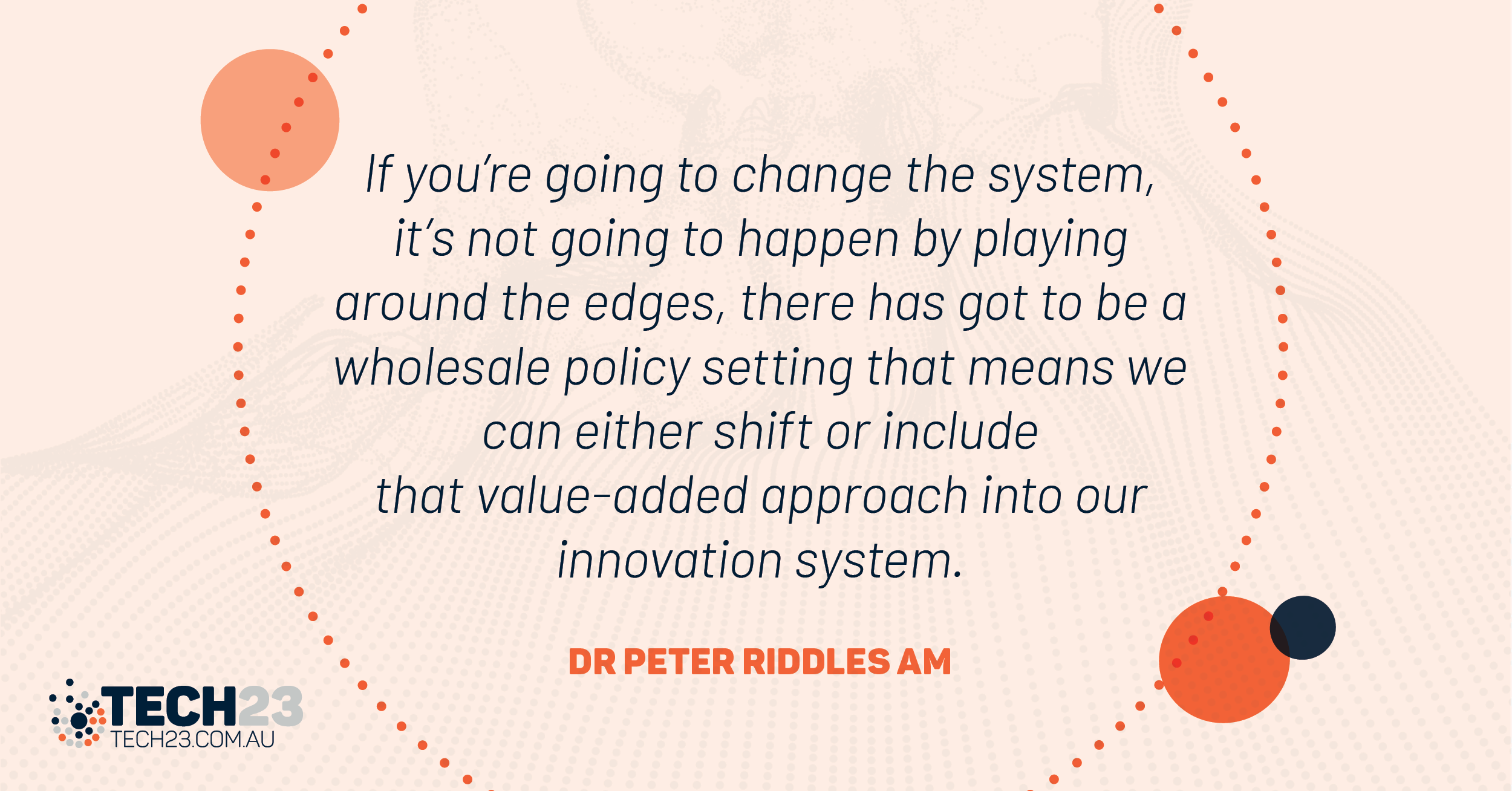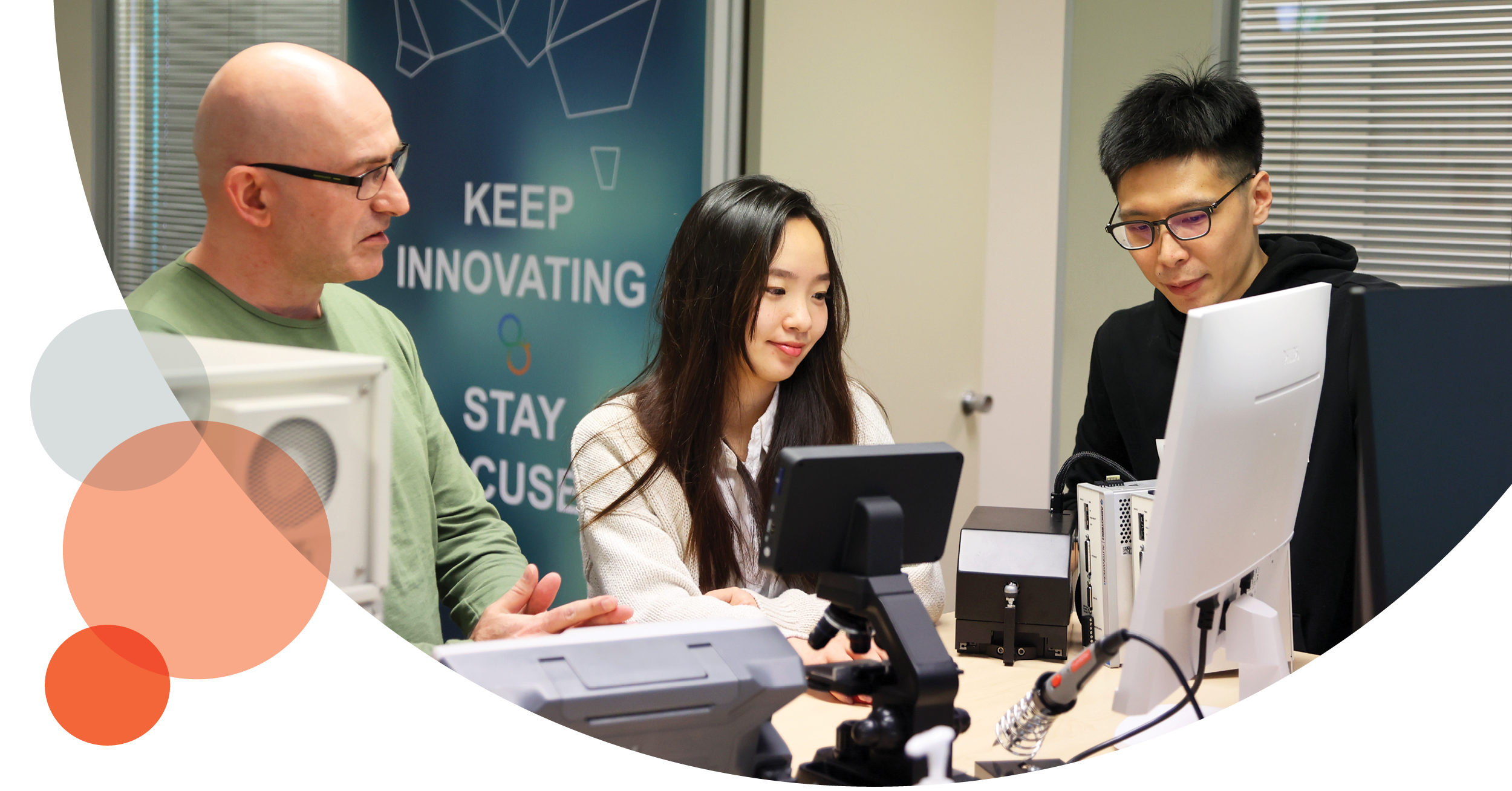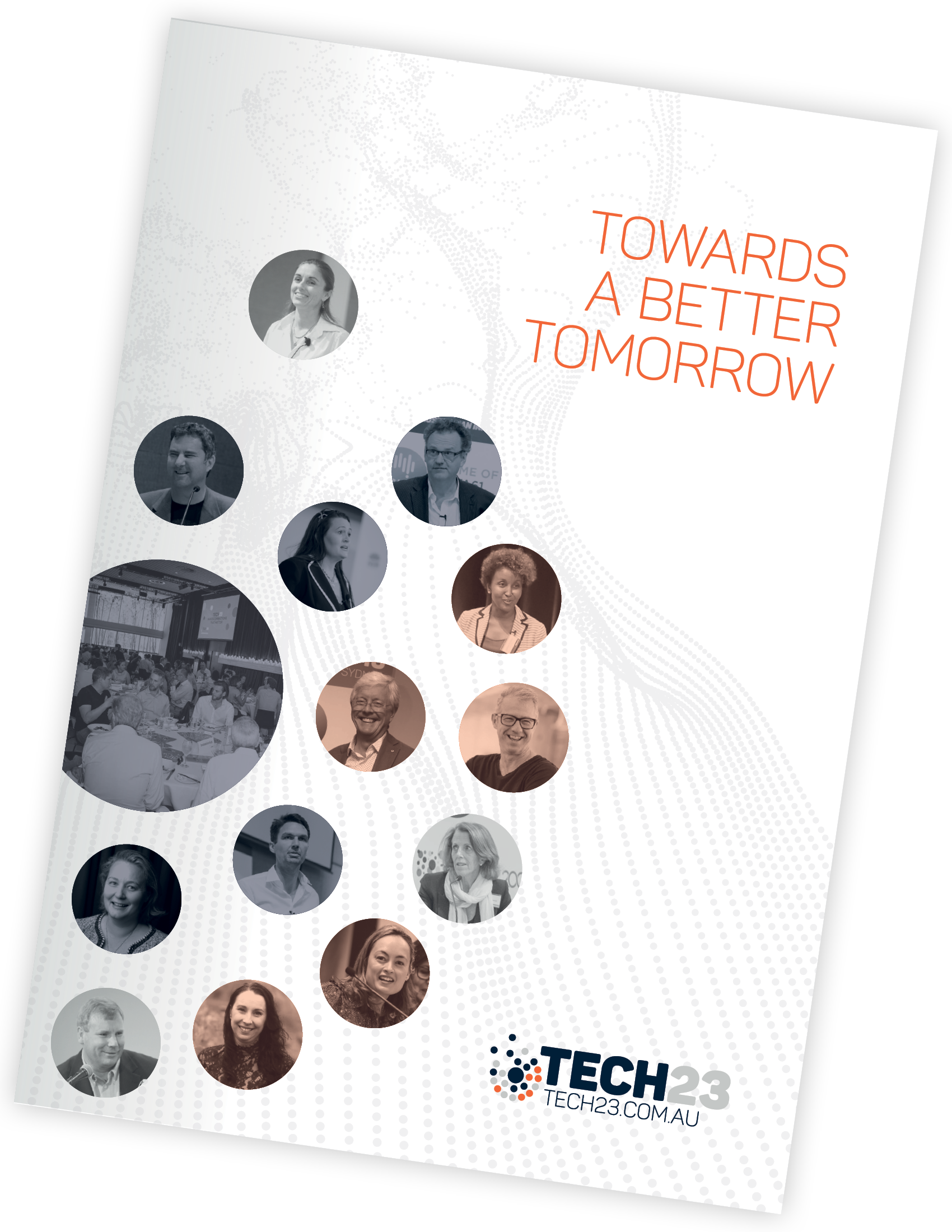By DR PETER RIDDLES AM
Director and Advisor; science and innovation

This article is an excerpt from the Tech23 2021 booklet Towards a Better Tomorrow.
I think like a scientist and ask, ‘What, what are we trying to improve?’ The innovation system is a sort of a process that delivers outcomes. The original definition of innovation is a process for making something new and useful – that’s what the word means. Up until this point in time, Australia has actually been quite good at innovation. Our economy is 65% services, about 10% commodities, which means about 80% of our economy is services and resources.
The innovation you do in those areas are often directed at markets and the cost of the goods, the cost of the services and business models. We do that very well. What people usually mean when they talk about improving innovation is actually the science piece, the bit where science is used to create new products, to manufacture new products and find markets for them. That has not been our strength for a little while – manufacturing is around 5% of our GDP.
About 100 years ago, after World War I, the then Prime Minister Billy Hughes said, well, where we’re far away from the rest of the world, we’ve just had World War I and the Spanish flu pandemic and we realise that we can’t make a lot of goods here in Australia. It was back then that the government then realised and set about changing that. That’s why CSL (Commonwealth Serum Laboratories) was formed in 1916, to manufacture vaccines and other biological products.
So we’re not going through something very new, we’ve just been reminded of the additional reasons why you might want to have a manufacturing capability, which often draws on technology.
The challenge for Australia is that if you want to do that, and if the argument is valid, which it probably is, it means you’ve got to change our innovation system from services and commodities, to also doing the value-add piece.
If you’re going to change the system, it’s not going to happen by playing around the edges, there has got to be a wholesale policy setting that means we can either shift or include that value-added approach into our innovation system.

If we want to diversify our economy, and be able to make things and use science and technology to improve lives, we have to look at countries that do that, and ask the question, ‘Why do they do that, and why don’t we do that as well as they do?’. We have a strong economy, we have a pretty equitable society and access to health and education. We’ve got to ask ourselves, ‘What’s going to drive that change?’ Because you don’t change things that are working reasonably well, because it’s a risk in the longer term.
To improve our sovereign capability in these areas, I don’t think that simple funding – such as grants and taxation benefits – is the solution. They are a useful adjunct to a more primary policy area. I think it was Plato who’s believed to have said, ‘And it is necessity who art the mother of invention.’ For a country like Australia to change its risk profile, when things look pretty good, is a big challenge.
This is what I’d do. In the US, for a long time, they’ve done innovation this way, which is not overtly stated, it’s not explicit, but when you look at it, it is quite clear. Since at least World War II, the US has applied public money – taxpayer money – to solve problems in the national interest. The simplest example was after World War II, the national roads agency funded the building of freeways and motorways in the US. That wasn’t about building nice roads for people to drive around as tourists, it was to ensure they had the ability to mobilise military forces quickly. But it meant that transport improved, domestic economies improved, interstate trade improved, tourism improved – so there was a huge additional economic benefit from that national security project.

The best example is the NASA project. That also was a national security thing, because it was about building missiles and rockets. But that project drove innovation across the US because they had to build the silicon chips – that’s where Silicon Valley began – the communications, the materials, the spaceships, the rockets, the fuels – all of those things needed innovators to drive that project. That national project drove investment and drove innovation and technology development.
Let’s go back to Australia. Are there any examples in Australia that have a similar kind of imperative?
My view is, if you want to change things at scale, that’s the approach you’ve got to take. Government solves a public problem, provides the funding, creates the market to make innovation a necessity.
There have been some examples in Australia that have worked really well like that, and there are some examples, which I think are a missed opportunity. Let’s look at the Snowy River Scheme. After World War II, the Victorian Government put up a proposal for using the waters from the Snowy River to drive electricity, and the New South Wales Government put up a similar proposal to drive water for irrigation. The Federal Government came in and said, we’ll do both.
That became a nation-building project – a lot of public money went into building it, and it benefited electricity, irrigation, local communities, tourism, and it brought in a lot of innovation talent – engineers and technicians who helped build this massive project. Immigration was very important in doing that. The legacy is obvious.
To look at some things where we might have done better. The National Disability Insurance Scheme (NDIS), for example, is a useful project for obvious reasons, could have been refined to help drive innovation in the healthcare sector better than it has. There wasn’t that connection.
I’m using ‘healthcare’ in a very general sense. A lot of funding went into the NDIS for the national benefit of improving the quality of life of people who might otherwise have less equity. It was supported across political parties. I recognise that the NDIS draws on lots of service providers. But we could have been more deliberate about driving all the innovations that might help overcome disabilities, for example, and really drive the growth of private sector healthcare innovation. I thought the connection was very sporadic and random. If you had a unifying government policy, or perhaps a state government policy, too, we could have connected the rise of innovation in that sector for even greater community benefit.
This is where the idea of having grants on their own don’t work, but if you had grants or incentives to drive the product for a real market, which is being created by NDIS, I think we could have seen a lot better growth in that sector. I’m not saying that’s a perfect solution, but that’s how these things are done in a few other countries, including the US and to some extent China.
Grants on their own have some effect, but they don’t necessarily lead to wholesale industry change, and that’s the aspiration for Australia: to get that bigger change to the system.
Read the perspectives of innovators in our midst
This article is an excerpt from the Tech23 2021 booklet Towards a Better tomorrow.

Read more…
From handheld devices to cyborg cows — the rise of AgTech in Australia
As we observe the growth of homegrown gems like The Yield and Ovass, along with Tech23 stars like FluroSat and Agersens, it becomes apparent that AgTech is a ripe field for local techies looking to make a global impact. Australia’s potential to become a major player...
From Tech23 to a global stage
Many Australian founders aim to take their ideas beyond our shores, making their mark overseas. Below are just some of the Tech23 founders who are driving their companies to become major players on a global stage. Geoff McQueen (Tech23 2009) is the CEO of Accelo...
Breaking down borders: Tech23 alumni excel in deep tech innovation
Tech23 would never have been possible — yet alone have reached its tenth anniversary — without a great deal of support from all corners of the startup ecosystem.

